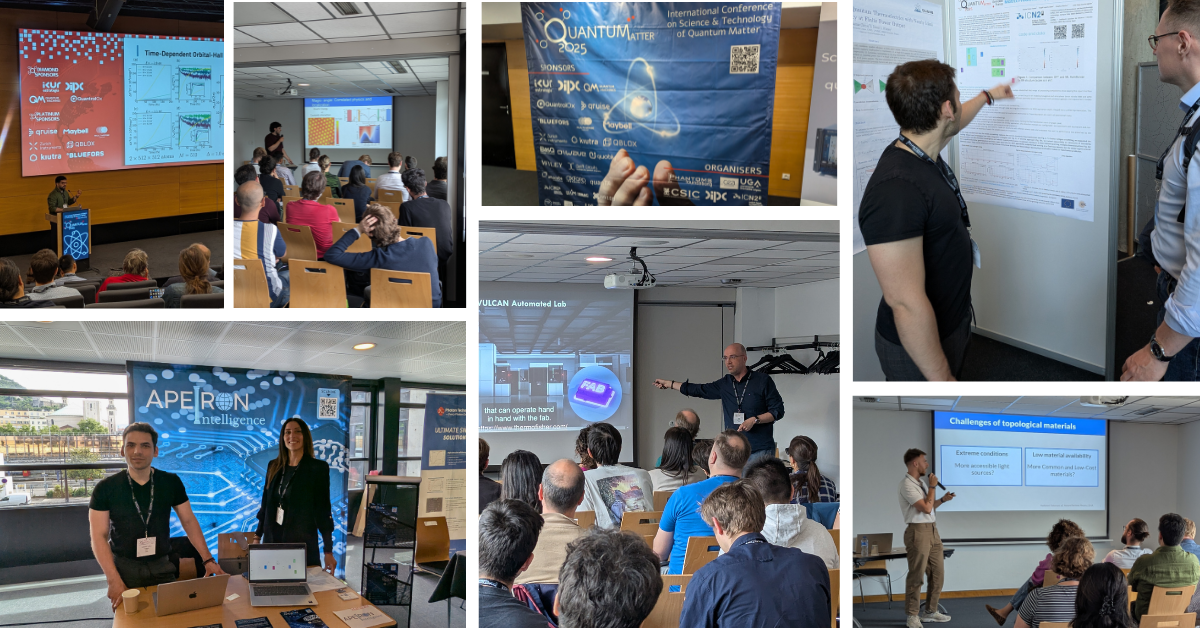Thursday, 29 May 2025
QUANTUMatter 2025: ICN2 Strengthens its Commitment to Quantum Sciences and Technologies
The international conference held in Grenoble brought together leading experts in this strategic field. ICN2 researchers played an active role both in the scientific organisation and through various talks and workshops.

From 20 to 23 May 2025, the city of Grenoble (France) hosted the 5th edition of the Quantum Matter International Conference – QUANTUMatter 2025, a renowned event for the scientific community working in the field of quantum sciences and technologies. The conference was organised by the Phantoms Foundation, the Donostia International Physics Center (DIPC), the Spanish National Research Council (CSIC), the University of Grenoble Alpes and ICN2. It brought together scientists, companies and representatives from research centres and universities to foster new ideas and interdisciplinary collaborations.
Key topics covered during the event included quantum computing, novel quantum materials, quantum sensing and quantum simulation. These areas are already beginning to transform many technological fields, from communication to data processing and advanced materials development. Given the relevance of these topics to ICN2's research areas, the institute was well represented at the event in terms of both scientific contributions and organisational involvement.
Several ICN2 researchers played a central role in organising the event and developing the scientific programme:
- ICREA Prof. Stephan Roche, leader of the Theoretical and Computational Nanoscience Group, was on the congress's Organising Committee.
- ICREA Prof. Sergio O. Valenzuela, leader of the Physics and Engineering of Nanodevices Group, chaired the International Scientific Committee.
The programme of talks and workshops also included the participation of other ICN2 researchers, among them:
- ICREA Prof. Jordi Arbiol, leader of the Advanced Electron Nanoscopy Group, participated as an invited speaker. In his talk, he explained his latest advances in the development of so-called ‘digital twins’, or digital models of quantum materials at the atomic level, which can be used, among other things, to predict their properties.
- Dr Luis Manuel Canonico spoke about his work on the development of new simulation methodologies. These technologies could be very useful in promoting the use of more sustainable materials in technological devices, such as graphene, instead of more contaminating heavy metals.
The talent of ICN2's young researchers was also very present at the conference. Specifically, Pedro Alcázar and Jorge Martínez participated as speakers in the PhD sessions. Dr Thomas Galvani and Andrei Voicu Tomut also presented their work at the poster sessions, where they were able to share and discuss the results of their research with the audience.
APEIRON, the new ICN2 spin-off that emerged from the Theoretical and Computational Nanoscience Group, also had a stand. Laura Fernández and Andrei Voicu Tomut represented the company, showcasing their current and future projects to the scientific and business communities.
ICN2's involvement in Quantum Matter 2025 reflects its dedication to advancing research excellence in the highly promising field of quantum sciences and technologies.

